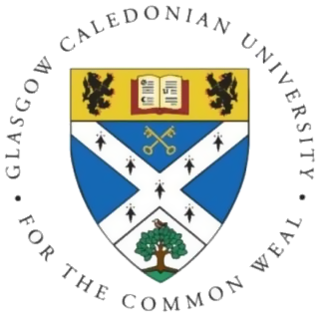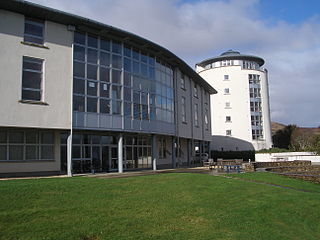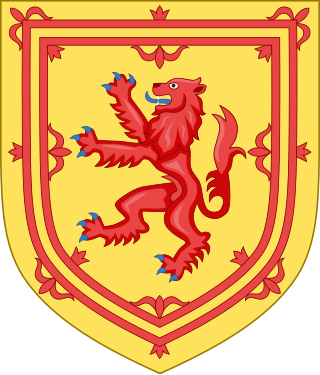
The University of St Andrews is a public university in St Andrews, Scotland. It is the oldest of the four ancient universities of Scotland and, following the universities of Oxford and Cambridge, the third-oldest university in the English-speaking world. St Andrews was founded in 1413 when the Avignon Antipope Benedict XIII issued a papal bull to a small founding group of Augustinian clergy. Along with the universities of Glasgow, Edinburgh, and Aberdeen, St Andrews was part of the Scottish Enlightenment during the 18th century.
Education in Scotland is the responsibility of the Scottish Government, and is overseen by its executive agency, Education Scotland.
The Science Council is a UK organisation that was established by Royal Charter in 2003. The principal activity of The Science Council is the promotion of the advancement and dissemination of knowledge of and education in science pure and applied, for the public benefit. The Science Council is the Competent Authority with respect to the European Union directive 2005/36/EC. It is a membership organisation for learned and professional bodies across science and its applications and works with them to represent this sector to government and others. Together, the member organisations represent over 350,000 scientists. The Science Council provides a forum for discussion and exchange of views and works to foster collaboration between member organisations and the wider science, technology, engineering, mathematics and medical communities to enable inter-disciplinary contributions to science policy and the application of science.
The Higher Education Funding Council for England (HEFCE) was a non-departmental public body in the United Kingdom, which was responsible for the distribution of funding for higher education to universities and further education colleges in England since 1992. It ceased to exist as of 1 April 2018, when its duties were divided between the newly created Office for Students and Research England.

Glasgow Caledonian University, informally GCU, Caledonian or Caley, is a public university in Glasgow, Scotland. It was formed in 1993 by the merger of The Queen's College, Glasgow and Glasgow Polytechnic.
MillionPlus, formerly known as million+, the Campaign for Mainstream Universities, and the Coalition of Modern Universities (CMU), is a membership organisation, which aims to promote the role of "modern universities" in the UK higher education system; it describes itself as "The Association for Modern Universities in the UK". MillionPlus is not for profit and funded by subscriptions from its members, currently 23 UK universities. While all of the member institutions are "new" universities, many have long histories as colleges and polytechnics.

Sabhal Mòr Ostaig is a public higher education college situated in the Sleat peninsula in the south of the Isle of Skye,Scotland with an associate campus at Bowmore on the island of Islay. Sabhal Mòr is an independent Academic Partner in the federal University of the Highlands and Islands. Its sole medium of instruction on degree courses is Scottish Gaelic.

The University of the Highlands and Islands (UHI) is an integrated, tertiary institution encompassing both further and higher education. It is composed of 12 colleges and research institutions spread around the Highlands and Islands, Moray and Perthshire regions of Scotland. UHI offers further education, undergraduate, postgraduate and research programmes which can be studied at a range of locations across the area and online. It has 31,000 students, including 19,779 further education students and 11,210 higher education students.

The Scottish Funding Council, referred to more formally as the Scottish Further and Higher Education Funding Council, is the non-departmental public body charged with funding Scotland's further and higher education institutions, including its 26 colleges and 19 universities.
K College, was also known as South & West Kent College, was an English college of Further Education and Higher Education with facilities across Kent, formed in April 2010, by the merger of South Kent College with West Kent College. In 2014 it was split again, between Hadlow College and East Kent College, with West Kent College being reestablished and the campus in Ashford becoming Ashford College.

West Lothian College is a further education institution in Livingston, West Lothian, Scotland. The Principal of the college is Jackie Galbraith, who was previously Vice-Principal at Ayrshire College.

BIMM Institute, formerly known as The British and Irish Modern Music Institute, is a group of eight independent colleges which specialise in the provision of music and creative education in Brighton, Bristol, London, Dublin, Manchester, Berlin, Birmingham, and Hamburg. The institute currently has over 7,000 students and provides Diploma, Degree and Masters level courses.

The Minister for Higher and Further Education is a Junior ministerial post in the Education Department of the Scottish Government. As a result, the Minister does not attend the Scottish Cabinet. The post was created in May 2007 after the appointment of the Scottish National Party minority administration and the Minister reports to the Cabinet Secretary for Education and Skills, who has overall responsibility for the portfolio, and is a member of cabinet. The Minister has specific responsibility for further education and colleges, higher education and universities, science and STEM (science, technology, engineering and mathematics, student funding, youth work, and widening access to education.

The Scotland Malawi Partnership (SMP) is a non-profit umbrella organisation which co-ordinates the activities of Scottish individuals and organisations with existing links to Malawi, and aims to foster further links between both countries. It is a charitable membership organisation, with over 1,100 members. It is independent of the Scottish Government and Scottish Parliament, although it works closely with both.

Dumfries and Galloway College is a further education college in Dumfries and Galloway, with campuses in Dumfries and Stranraer.

The Department for Education (DfE) is a department of His Majesty's Government responsible for child protection, child services, education, apprenticeships and wider skills in England.

Edinburgh College is a further and higher education institution with campuses in Edinburgh and Midlothian, Scotland. It serves the Edinburgh Region, Edinburgh, East Lothian and Midlothian, and is the largest college in Scotland. It was formed on 1 October 2012 as part of the merger of Edinburgh's Jewel and Esk, Telford, and Stevenson colleges. The college has four campuses, all of which were previously the campuses of the constituents of the merger: Jewel and Esk's College Milton Road (Jewel) Campus and Eskbank Campus ; Edinburgh Telford College ; and Stevenson College Edinburgh

Scotland's Rural College (SRUC) is a public land based research institution focused on agriculture and life sciences. Its history stretches back to 1899 with the establishment of the West of Scotland Agricultural College and its current organisation came into being through a merger of smaller institutions.

Caledonian Braves Football Club is a Scottish semi-professional football club based in North Lanarkshire. They are members of the Lowland Football League, in the fifth tier of the Scottish football league system.
COLEG, short for the Colleges Open Learning Exchange Group, was a Scottish charity organization established in January 1995 to facilitate the generation, exchange and use of flexible learning materials. It was formally incorporated in 1998. It was subsumed into other projects in 2009. While not an Open Educational Resources organization, it provided early sharing of electronic resources between different institutions. It was merged into the Scotland's Colleges project in 2009, and ultimately into the rebranded Colleges Development Network.













